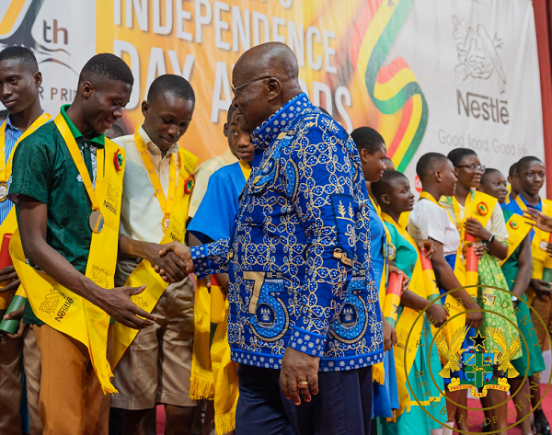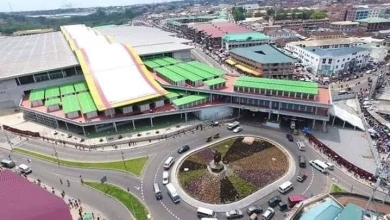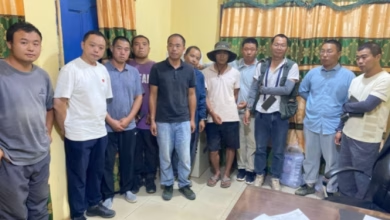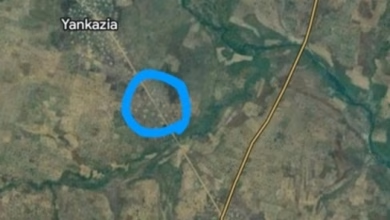Excellent Grades Not Enough, Acquire Skills – President Nana Addo

- Formal education is not just about securing excellent academic grades
- Two visually impaired and two hearing impaired students were also given awards
- Government had fostered partnership between tertiary education and industry
President Nana Addo Dankwa Akufo-Addo has urged Ghanaian youth, especially students, to bear in mind that formal education is not just about securing excellent academic grades.
He said students must additionally acquire skills, values and knowledge that would empower them to make a positive impact on the world.
He encouraged them to be curious, compassionate and resilient because the country looked up to them not only as scholars but also as ambassadors of the nation’s potential in engendering progress, prosperity and development.
President Akufo-Addo gave the advice at the President’s Independence Day Awards 2024 in Accra last Friday.
At the annual event, 46 students were adjudged the overall best among the 602,477 that sat the 2023 Basic Education Certificate Examination (BECE) and were honoured by the President at a ceremony that has become part of the National Independence Day celebration.
Out of the number, 36 were selected from public schools, with the remaining 10 from private schools.
This is the first time students from private schools have been added to the list of awardees.
All the 46 students, who were representative of all the 16 regions, were selected based on their outstanding raw scores obtained during the examination.
Two visually impaired and two hearing impaired students were also given awards for their performances at the exams.
Success
President Akufo-Addo said the successes chalked up by the students were not just personal achievements, but had made them a beacon of hope for the entire nation.
“Ghana’s future lies in the hands of her youth, and you represent the bright future we envision.
I urge you to recognise the responsibility that comes with academic success; a responsibility to contribute positively to the development and progress of our society,” he added.
He exhorted the students that as they progressed in their Pull quote educational journey, whether through senior high school or other pursuits, it was important that they strove for excellence, adding that “this is just the beginning, and the path ahead is filled with opportunity for growth and exploration”.
President Akufo-Addo urged the students to seize every chance to expand their horizon, embrace challenges, and continue to excel in all their endeavours.
Pride
The President commended the students for bringing pride to their communities, parents, schools and themselves, stressing that it was appropriate that they received the plaudits.
He further stressed the commitment of his administration towards education, saying this was not just a moral one but a strategic investment in the intellectual capital that would drive the nation’s economy and innovation in the years to come.
He said to ensure that all students were able to write the BECE and not encumbered by registration fees, government took the decision to absorbed all registrations fees, among other interventions, such as the provision of feeding grants for special schools which had culminated in increased access.
Dropout
To bring back young people who dropped out of primary school, government introduced the Ghana Educational Outcome Project (GEOP), which has taken more than 17,000 out-of-school children through the programme and incorporated them into formal education.
The programme, President Akufo-Addo said, won the Gulf Tech Prize in February 2024 at the World Government Summit in Dubai.
In addressing the confusion that had arisen about the position of Ghanaian languages at the basic school level, he said just as had been the practice over the years, junior high school students would continue to be examined in at least one Ghanaian language, which would be compulsory on the elective list.
He added that a meeting between the major stakeholders, namely the Ministry of Education, the Ghana Education Service and the West African Examinations Council (WAEC), had satisfactorily resolved the issue.
Through targeted policies and initiatives, the President said, the government had worked hard to bridge the gender disparity gap in enrolment and retention rate at all levels of education.
He said empowering girls with education would not only transform their lives, but also contribute to the overall development and prosperity of the nation.
President Akufo-Addo said aside from the free SHS offering secondary education access to over 1.4 million Ghanaian learners, government had also restructured the curriculum to ensure that it was relevant to the needs of the 21st century and this included the promotion of critical thinking, creativity, and innovation.
He said the government was paying attention to all sectors of education, emphasising that kindergarten, primary and junior high schools were being supported and provided with all the necessary infrastructure and other inputs to provide a solid foundation to strengthen the free SHS policy.
The President said the government had fostered partnership between tertiary education and industry to provide students with practical training, internship and research opportunities to ensure that the graduate had both the theoretical and hands-on practical skills that were applicable in their chosen fields.
He commended teachers and parents, saying their efforts had produced excellent future leaders, and paid glowing tribute to Nestlé Ghana Limited for sponsoring the awards for the past 21 years.
A Deputy Minister of Education, Dr John Ntim Fordjour, said out of the GH¢114 billion spent on education since 2017, free SHS consumed GH¢12.9 billion, which was just about 11 per cent of the total amount.
He said over GH¢100 billion was spent on other sectors of education towards efforts to transform the entire educational sector of the country.
He said in 2015, when the Early Grading Assessment was conducted across the country for primary two learners, only two per cent of the learners could read, while 38 per cent of primary two pupils could read when same examination was conducted in 2022.
These, he said, were testaments that transformation was taking place even at the foundational level of education.






